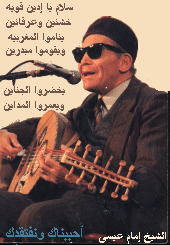Two Singers I love
Mounir and Imam
Music is the organized movement of sounds, particularly pitches, through a continuum of time. While the general principles have been retained, the tradition of the Egyptian music has changed throughout the late years. The lyrics, tunes and even the effect of that music on audience differed. There are many similarities and differences between Mohammed Mounir and Sheikh Imam as two Egyptian popular singers of two different eras in Egypt.
 As for Imam's lyrics, they are direct and they tackle serious problems. For example, the song titled "Etgamaao El-Oshak" (the Lovers Have Gathered), hits on the right nail as it deals with the feelings of oppression caused by capturing many Egyptians those days. Moreover, Imam's lyrics have weighty notions about freedom, revolution and patriotism. For instance, the song "El-Mamnoat" (The Don'ts) expresses the affections of a patriot person who is prevented from traveling, speaking and the feeling of displeasure.
As for Imam's lyrics, they are direct and they tackle serious problems. For example, the song titled "Etgamaao El-Oshak" (the Lovers Have Gathered), hits on the right nail as it deals with the feelings of oppression caused by capturing many Egyptians those days. Moreover, Imam's lyrics have weighty notions about freedom, revolution and patriotism. For instance, the song "El-Mamnoat" (The Don'ts) expresses the affections of a patriot person who is prevented from traveling, speaking and the feeling of displeasure.
Concerning Imam's tunes, they can be described as simple tunes. In Imam's songs, two instruments only were used, lute and tambourine. Those simple tunes are to reach people's hearts easily. On the other hand, being uncomplicated, the tunes of Imam's songs became easy to keep. In addition to this, Imam's tunes can also be called "active" tunes as they let one move with them. Those active tunes are suitable for the subjects and lyrics sung by Sheikh Imam.
Regarding the effect of Imam's songs on audience, his songs affected people in a strange way. For example, some of the demonstrations in Egypt took place after listening to one of Imam's songs. Furthermore, people loved Imam's singing and they recited his songs. Some people keep his songs by heart until now. In addition to this, some people who loved Imam's songs kept his tapes and records despite of the government's resentment.
With regard to Mounir's lyrics, they are no more direct when compared to those of Imam. In other words, songs became full of symbols that imply deeper meanings. For example, the song "Hadouta Masria" (An Egyptian Tale) carries many sentences that say something and mean something else at the same time. Both Mounir and Imam sung some of their songs written by the same composer. For instance, Ahmed Foad Negm who wrote an album, "El-Malek Howa El-Malek" (A King is the King), for Mounir, wrote most of Imam's songs.
As to Mounir's tunes, they are more sophisticated if compared to Imam's simple ones. It is because of the development of the musical instruments and because Mounir depended for some time on foreign musicians with Western instruments. In spite of the sophistication of the tunes in Mounir's songs, just like Sheikh Imam, his songs are kept easily. Over and above, Mounir's melodies are mostly faster than Imam's ones.
In respect of the effect of Mounir's songs on audience, people love his songs and recite them day and night. Unlike Sheikh Imam, Mounir's songs do not affect people to the degree that they take any reaction towards what is said in those songs. Although both Mounir and Imam's songs tackle, nearly, the same subjects, the effect of their singing on people is not the same.
It is quite clear that the Egyptian music has changed in many ways and for different reasons in the late years. This is illustrated through comparing and contrasting Mohammed Mounir and Sheikh Imam as two Egyptian singers representing two distinctive periods in Egyptian music.
Music is the organized movement of sounds, particularly pitches, through a continuum of time. While the general principles have been retained, the tradition of the Egyptian music has changed throughout the late years. The lyrics, tunes and even the effect of that music on audience differed. There are many similarities and differences between Mohammed Mounir and Sheikh Imam as two Egyptian popular singers of two different eras in Egypt.
 As for Imam's lyrics, they are direct and they tackle serious problems. For example, the song titled "Etgamaao El-Oshak" (the Lovers Have Gathered), hits on the right nail as it deals with the feelings of oppression caused by capturing many Egyptians those days. Moreover, Imam's lyrics have weighty notions about freedom, revolution and patriotism. For instance, the song "El-Mamnoat" (The Don'ts) expresses the affections of a patriot person who is prevented from traveling, speaking and the feeling of displeasure.
As for Imam's lyrics, they are direct and they tackle serious problems. For example, the song titled "Etgamaao El-Oshak" (the Lovers Have Gathered), hits on the right nail as it deals with the feelings of oppression caused by capturing many Egyptians those days. Moreover, Imam's lyrics have weighty notions about freedom, revolution and patriotism. For instance, the song "El-Mamnoat" (The Don'ts) expresses the affections of a patriot person who is prevented from traveling, speaking and the feeling of displeasure.Concerning Imam's tunes, they can be described as simple tunes. In Imam's songs, two instruments only were used, lute and tambourine. Those simple tunes are to reach people's hearts easily. On the other hand, being uncomplicated, the tunes of Imam's songs became easy to keep. In addition to this, Imam's tunes can also be called "active" tunes as they let one move with them. Those active tunes are suitable for the subjects and lyrics sung by Sheikh Imam.
Regarding the effect of Imam's songs on audience, his songs affected people in a strange way. For example, some of the demonstrations in Egypt took place after listening to one of Imam's songs. Furthermore, people loved Imam's singing and they recited his songs. Some people keep his songs by heart until now. In addition to this, some people who loved Imam's songs kept his tapes and records despite of the government's resentment.
With regard to Mounir's lyrics, they are no more direct when compared to those of Imam. In other words, songs became full of symbols that imply deeper meanings. For example, the song "Hadouta Masria" (An Egyptian Tale) carries many sentences that say something and mean something else at the same time. Both Mounir and Imam sung some of their songs written by the same composer. For instance, Ahmed Foad Negm who wrote an album, "El-Malek Howa El-Malek" (A King is the King), for Mounir, wrote most of Imam's songs.
As to Mounir's tunes, they are more sophisticated if compared to Imam's simple ones. It is because of the development of the musical instruments and because Mounir depended for some time on foreign musicians with Western instruments. In spite of the sophistication of the tunes in Mounir's songs, just like Sheikh Imam, his songs are kept easily. Over and above, Mounir's melodies are mostly faster than Imam's ones.
In respect of the effect of Mounir's songs on audience, people love his songs and recite them day and night. Unlike Sheikh Imam, Mounir's songs do not affect people to the degree that they take any reaction towards what is said in those songs. Although both Mounir and Imam's songs tackle, nearly, the same subjects, the effect of their singing on people is not the same.
It is quite clear that the Egyptian music has changed in many ways and for different reasons in the late years. This is illustrated through comparing and contrasting Mohammed Mounir and Sheikh Imam as two Egyptian singers representing two distinctive periods in Egyptian music.

